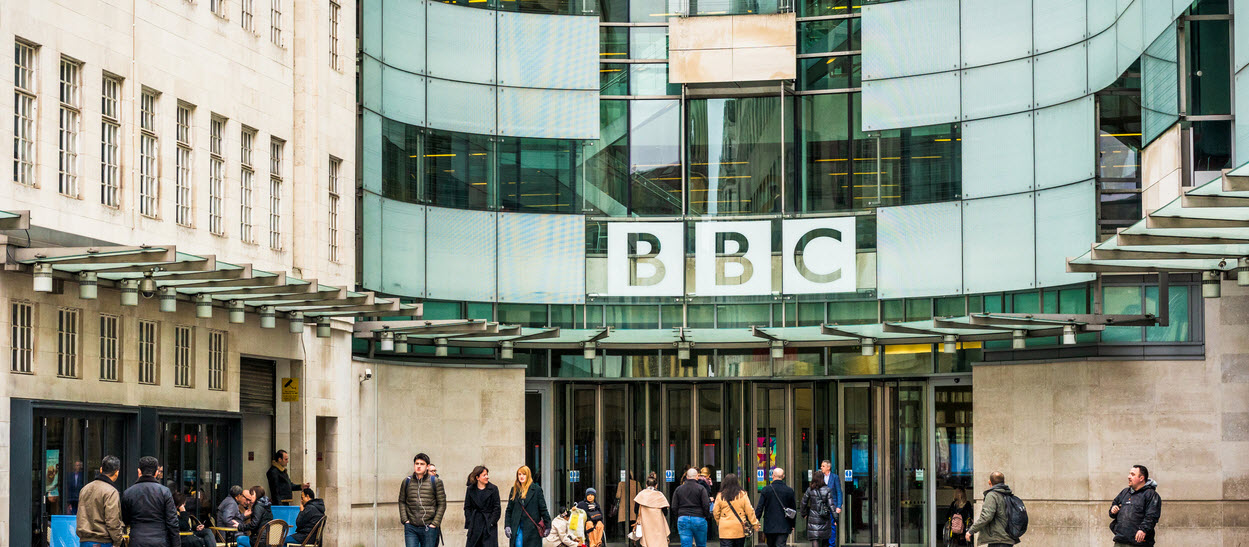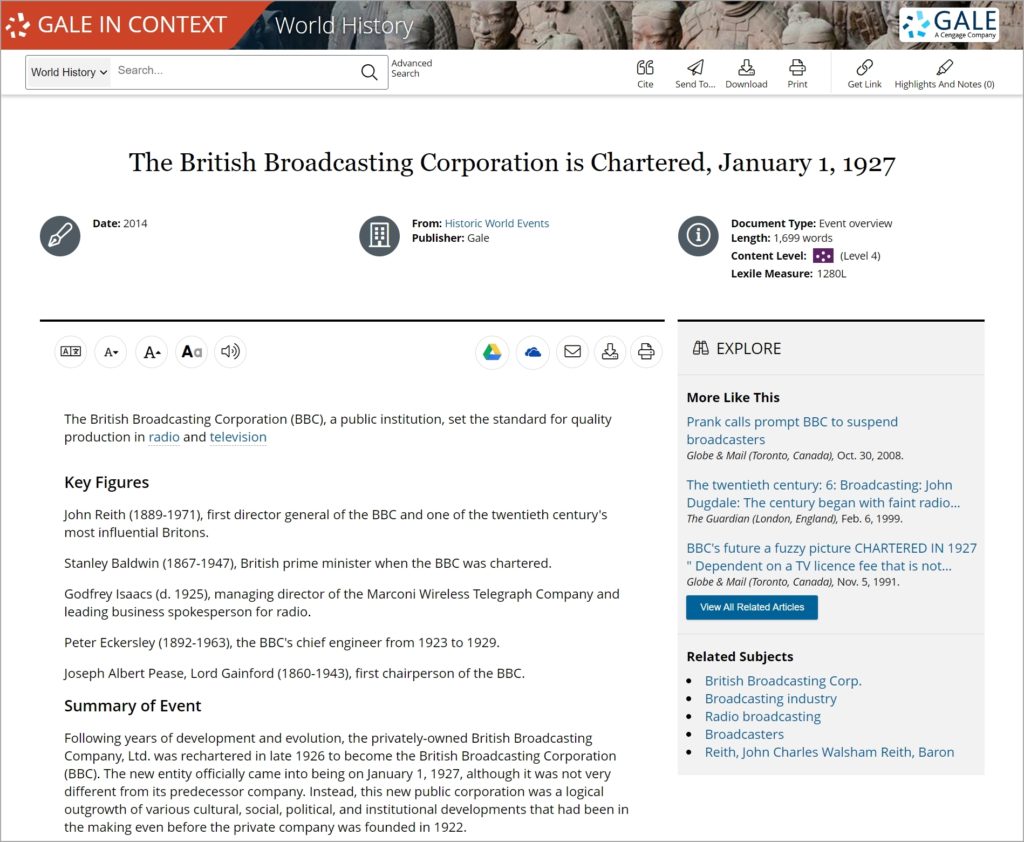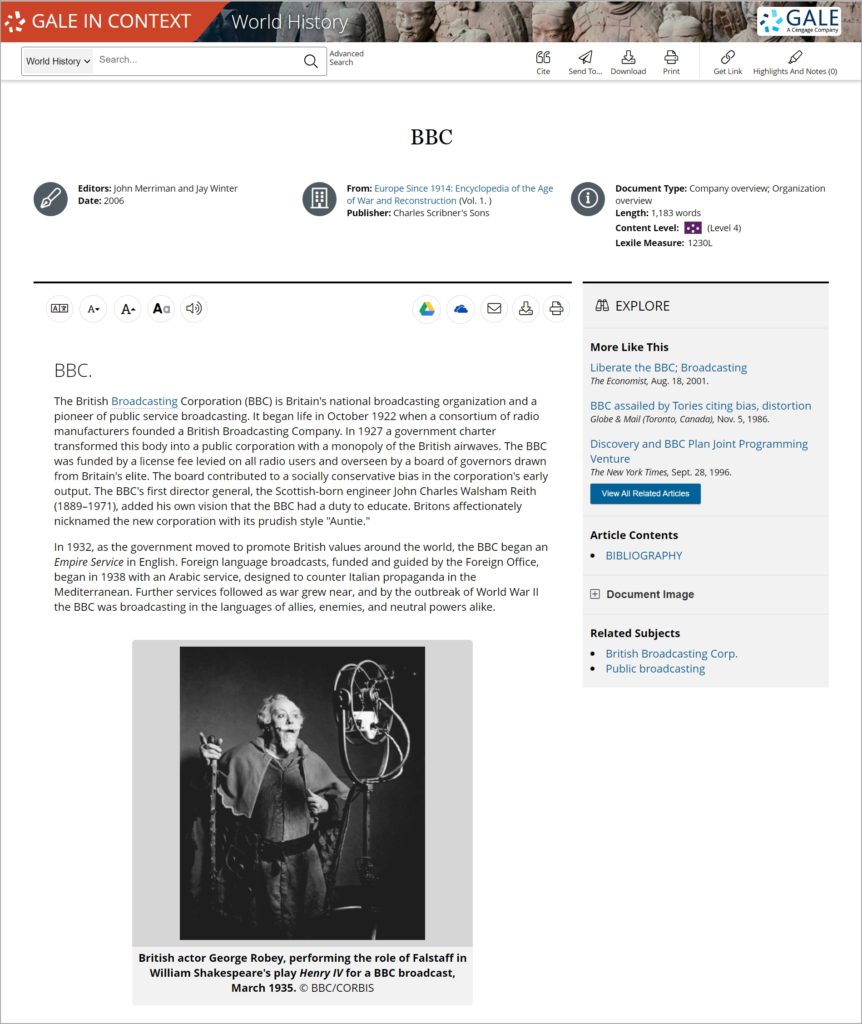| By J. Robert Parks |
On October 18, 1922, the British Broadcasting Company was founded. Known throughout the world as the BBC, it was originally a private company that was granted a monopoly on wireless communication. Of course, in those days, wireless communication had nothing to do with cell phones or texting. Instead, it was about radio and the British government bringing order to the development of early broadcasting. Gale In Context: World History provides a rich collection of resources for librarians and teachers about the early days of radio, how the BBC became one of the most well-known and distinguished news companies in the world, and the impact it has made on Britain and around the globe.
Before 1920, radio was the province of amateur enthusiasts, although World War I had sparked some interest in its technology. In the early 1920s, however, a number of companies were starting to explore its commercial possibilities. The Post Office, which was in charge of radio in Britain by virtue of its authority over telegrams, decided in 1922 to combine the various companies into one private company. Initially and ironically, the BBC wasn’t allowed to have its own news service―so that it wouldn’t compete with newspapers. For the same reason, advertising also wasn’t allowed, but a fee was collected from households that had radios, which provided the revenue for the company to operate.
Two key individuals in the development of the BBC were Joseph Albert Pease, its first chair, and John Charles Walsham Reith. Reith believed that the BBC’s primary function was to educate rather than entertain, and that became the company’s foundation. The BBC grew rapidly from the beginning. In 1922, it had four employees. By the end of 1923, it had 400. The audience also grew dramatically. By 1924, there were a million privately owned receivers in Britain. That year, the BBC broadcast a speech by King George V that was heard by an estimated 10 million listeners.
In 1927, the BBC was transformed into a public company, inspired by the belief that broadcasting should be for the public good. It was supported and controlled by the British government. Reith established advisory committees for topics such as religion and music—to deal with controversial issues and to help set a professional tone. The emphasis on education and proper, even prudish, behavior (announcers had to wear dinner jackets when they worked even though no one could see them!) led listeners to affectionately call the BBC “Auntie.”
The BBC has been credited with breaking down some of the regional and class divisions within Britain. Before radio became popular, the dialects and accents British people used often betrayed where they were from and what class they belonged to. The BBC’s announcers had to speak in a particular style, what became known as “BBC English,” and this influenced how people from around the country spoke.
Given that it was a public service, the BBC strove to be nonpartisan and objective. When Winston Churchill wanted to use the BBC as a vehicle for government information, Reith insisted that it remain objective and present politicians from all sides.
One of the most significant parts of the BBC began in December 1932, when the company launched its BBC Empire Service. It was initially designed to reach English speakers across the British Empire, but with funding through the Foreign Secretary’s office, it launched broadcasts in different foreign languages, beginning with Arabic in 1938. This was designed both to foster British values and to counter foreign propaganda. Later that year, the BBC launched services in German, Italian, and French, and within a few years it was broadcasting in every major European language.
During World War II, the BBC became known for its credibility in how it presented the news, which was a powerful contrast to the propaganda of the Nazi-controlled radio networks. The BBC didn’t exaggerate British victories or shy away from describing its defeats. It was also vital at home during the war, encouraging unity and helping to maintain morale with comedy programs and dance music.
After the war was over, the BBC World Service became a key part of undermining communism, as the Soviet Union and other communist countries fought to jam its radio signal so that their people didn’t know what life was like in the West. Because of its credibility, the BBC has been a preferred news source for much of the world, and totalitarian governments have often tried to block its radio signal. The BBC has also influenced other news companies. When Al Jazeera began in 1996, many of its early journalists were hired from the BBC Arabic news staff, and they used the BBC’s objectivity as a model.
Today many people associate the BBC with its television networks. The BBC had experimented with television as early as 1929, and it launched a small television service in 1936, but that was shut down during World War II. After World War II, however, the BBC’s television service started again, and its televised coverage of Elizabeth II’s coronation in 1953 is credited with motivating many Britons to embrace the medium. Given its emphasis on education over entertainment, the BBC has often lagged behind the trends in popular culture—for example, it didn’t create its first pop music station until 1967—but its television network has been a mainstay for iconic British soap operas and has been the home of the popular Doctor Who character since the show started featuring the Doctor in 1963. As the BBC enters its second century, it continues to be a renowned fixture of British culture.
About the Author
J. Robert Parks is a former professor and frequent contributor to Gale InContext: U.S. History and Gale In Context: World History who enjoys thinking about how our understanding of history affects and reflects contemporary culture.



